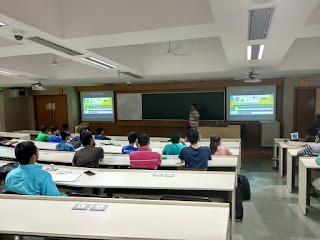EP 311 Solid state and nuclear physics lab (Spring 2017-18)
Instructor Name Avinash Mahajan, Pragya Das Prerequisites NA Important Topics Covered Experiments in solid state physics involving measurement of electron spin resonance, nuclear magnetic spin resonance and theoretical concepts behind these phenomenon, measurement of temperature dependence of semiconductor and band gap, dielectric constant of materials, and Hall effect. Experiments in nuclear physics involving measurement of absorption coefficient of Gamma rays, gamma ray energies using scintillation spectrometer, Compton scattering, angular correlation of gamma ray photons released in electron positron annihilation, working of Geiger counter. Assignments 10 experiments in total. 5 in NP and 5 in SSP. Grading of each experiment varies depending on NP/SSP experiment. Exams and Grading One practical exam and one quiz before endsems. Quiz is mostly easy, tests concepts and only a few questions are factual. Books/Online Study Material Reading...

